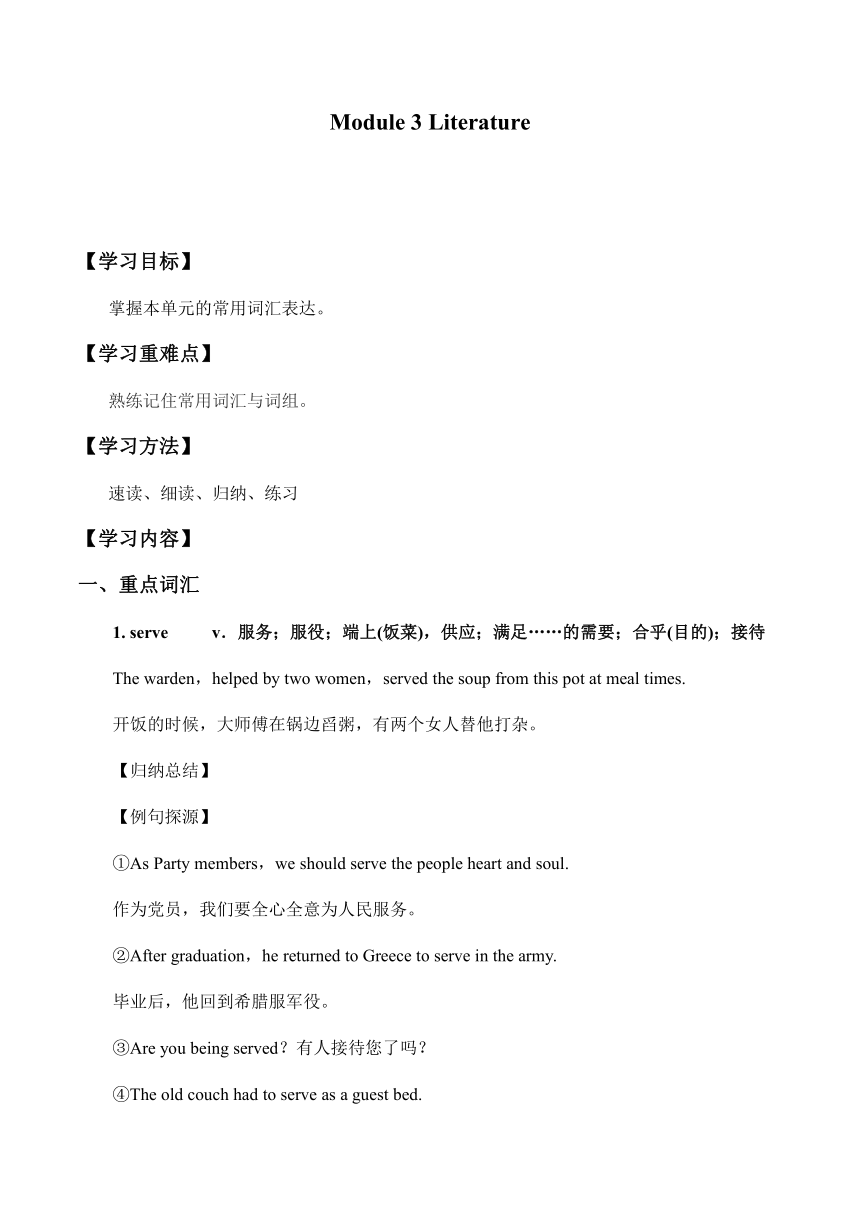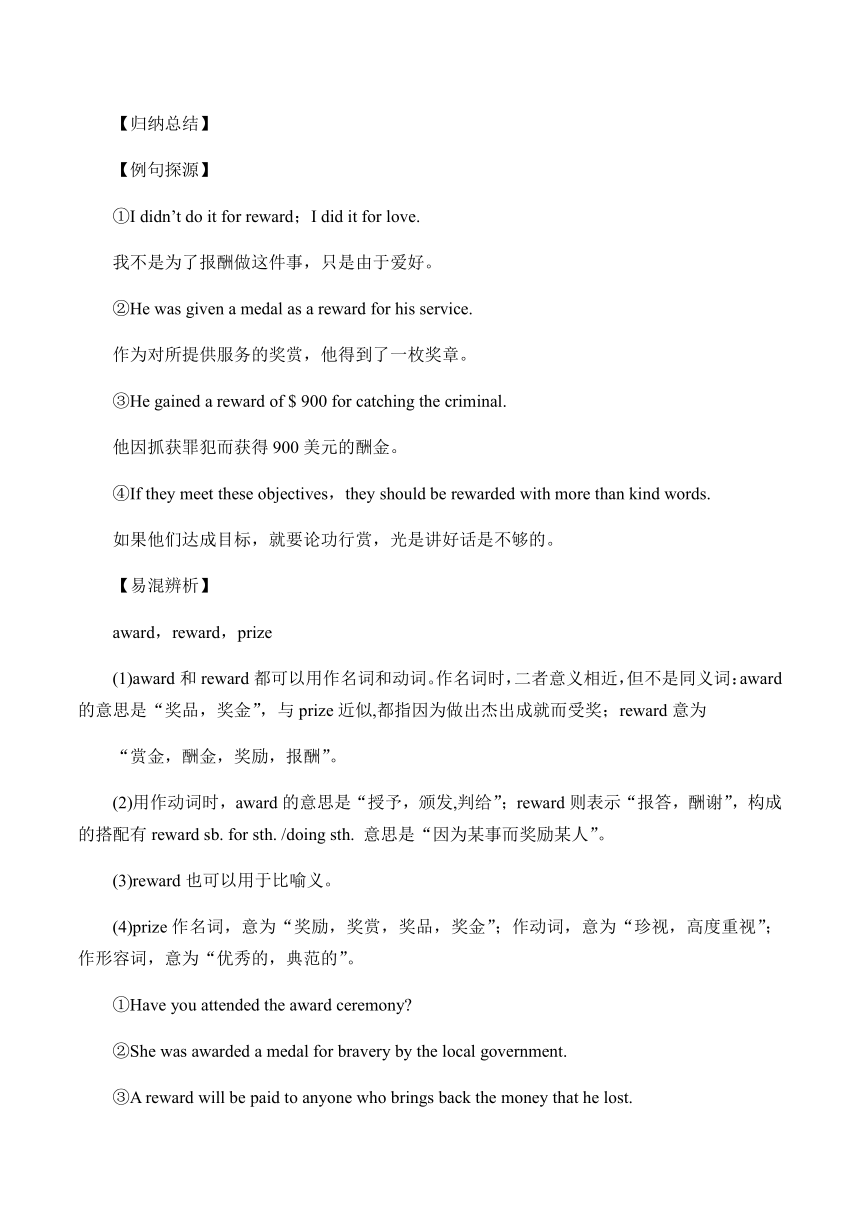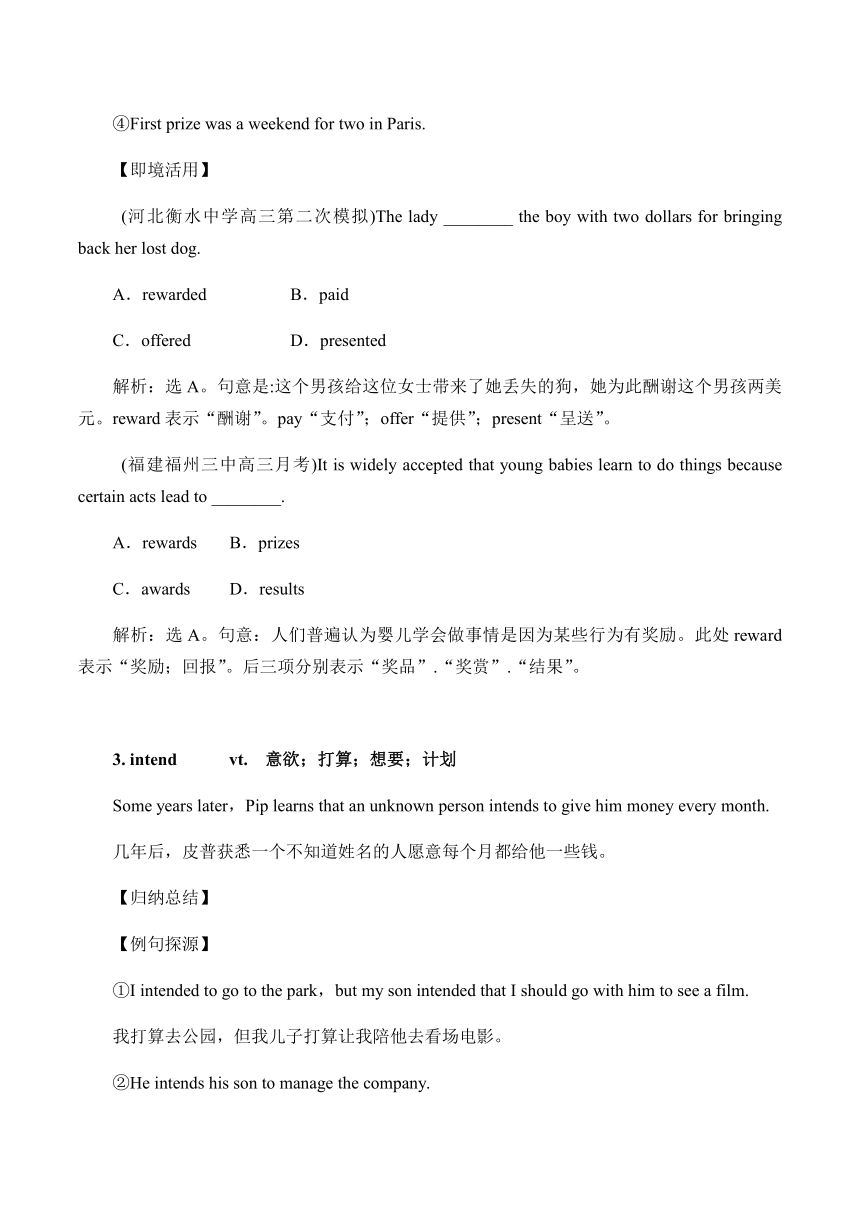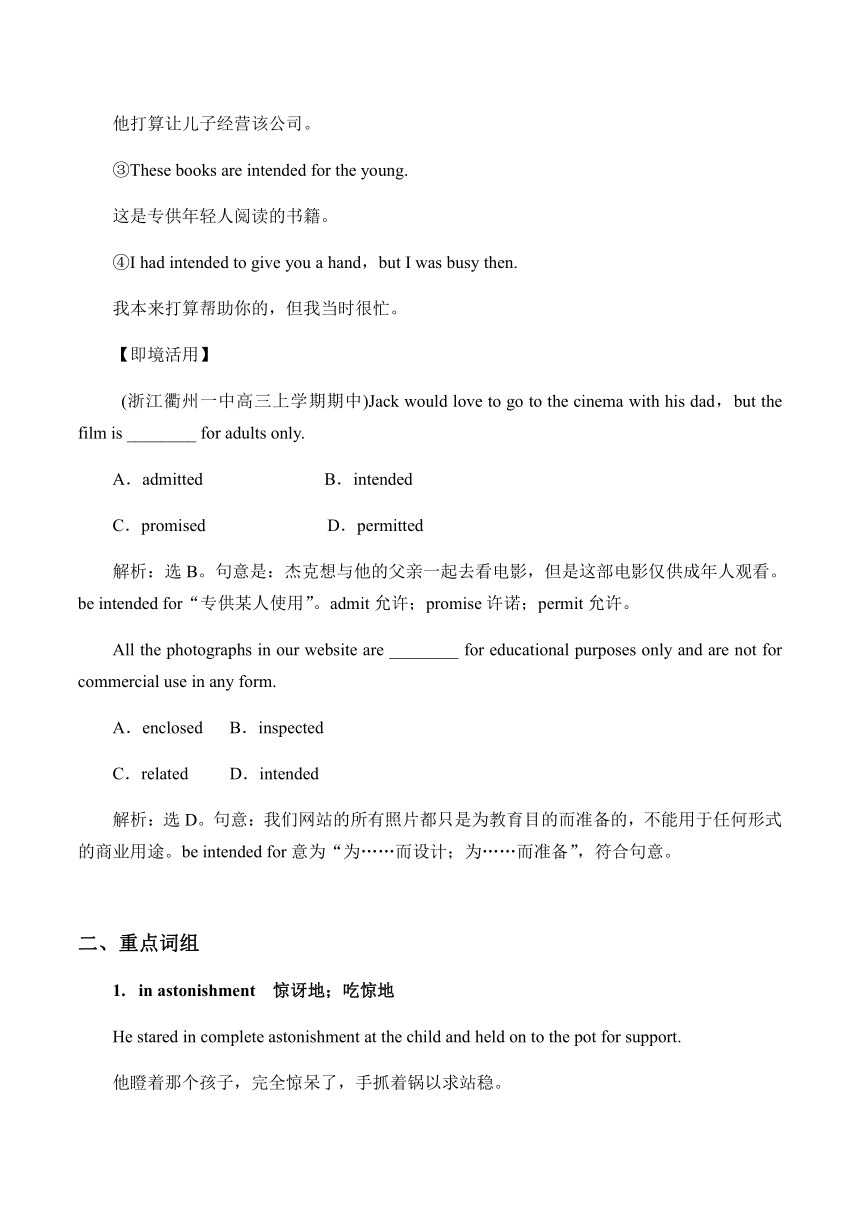外研版选修七-Module 3 Literature-学案(有答案)
文档属性
| 名称 | 外研版选修七-Module 3 Literature-学案(有答案) |

|
|
| 格式 | zip | ||
| 文件大小 | 46.0KB | ||
| 资源类型 | 教案 | ||
| 版本资源 | 外研版 | ||
| 科目 | 英语 | ||
| 更新时间 | 2020-02-23 00:00:00 | ||
图片预览





文档简介
Module 3 Literature
【学习目标】
掌握本单元的常用词汇表达。
【学习重难点】
熟练记住常用词汇与词组。
【学习方法】
速读、细读、归纳、练习
【学习内容】
一、重点词汇
1. serve v.服务;服役;端上(饭菜),供应;满足……的需要;合乎(目的);接待
The warden,helped by two women,served the soup from this pot at meal times.
开饭的时候,大师傅在锅边舀粥,有两个女人替他打杂。
【归纳总结】
【例句探源】
①As Party members,we should serve the people heart and soul.
作为党员,我们要全心全意为人民服务。
②After graduation,he returned to Greece to serve in the army.
毕业后,他回到希腊服军役。
③Are you being served?有人接待您了吗?
④The old couch had to serve as a guest bed.
这张旧的长沙发只好用作客人的床了。
⑤The two are not the same and don’t serve the same purpose.
二者不是一回事,并且用途也不同。
【即境活用】
Dinner is ________ from six to nine in that restaurant. For twenty years this practice has ________ unchanged.
A.eaten;lasted B.served;remained
C.given;kept D.ordered;developed
解析:选B。句意是:那家饭店从六点到九点提供晚餐。长达二十年了,这种习惯一直没有改变。第一个空用serve的被动语态形式,表示“(饭菜)被提供”。第二个空用remained作系动词用,表示“保持”,unchanged作表语。
The animal bones found in the tomb will ________ as important materials for the scientific study.
A.look B.treat
C.serve D.regard
解析:选C。serve as充当。句意为“在这墓中发现的动物骨头,将作为科学研究的重要材料。”
2. reward n. 报酬;奖励;赏金
vt. 酬劳;奖赏
The next morning a notice was put up on the door of the workhouse,offering a reward to anybody who would employ Oliver Twist.
第二天早晨,济贫院大门外贴出了一张告示,向愿意雇用奥利弗的人提供奖赏。
【归纳总结】
【例句探源】
①I didn’t do it for reward;I did it for love.
我不是为了报酬做这件事,只是由于爱好。
②He was given a medal as a reward for his service.
作为对所提供服务的奖赏,他得到了一枚奖章。
③He gained a reward of $ 900 for catching the criminal.
他因抓获罪犯而获得900美元的酬金。
④If they meet these objectives,they should be rewarded with more than kind words.
如果他们达成目标,就要论功行赏,光是讲好话是不够的。
【易混辨析】
award,reward,prize
(1)award和reward都可以用作名词和动词。作名词时,二者意义相近,但不是同义词:award的意思是“奖品,奖金”,与prize近似,都指因为做出杰出成就而受奖;reward意为
“赏金,酬金,奖励,报酬”。
(2)用作动词时,award的意思是“授予,颁发,判给”;reward则表示“报答,酬谢”,构成的搭配有reward sb. for sth. /doing sth. 意思是“因为某事而奖励某人”。
(3)reward也可以用于比喻义。
(4)prize作名词,意为“奖励,奖赏,奖品,奖金”;作动词,意为“珍视,高度重视”;作形容词,意为“优秀的,典范的”。
①Have you attended the award ceremony?
②She was awarded a medal for bravery by the local government.
③A reward will be paid to anyone who brings back the money that he lost.
④First prize was a weekend for two in Paris.
【即境活用】
(河北衡水中学高三第二次模拟)The lady ________ the boy with two dollars for bringing back her lost dog.
A.rewarded B.paid
C.offered D.presented
解析:选A。句意是:这个男孩给这位女士带来了她丢失的狗,她为此酬谢这个男孩两美元。reward表示“酬谢”。pay“支付”;offer“提供”;present“呈送”。
(福建福州三中高三月考)It is widely accepted that young babies learn to do things because certain acts lead to ________.
A.rewards B.prizes
C.awards D.results
解析:选A。句意:人们普遍认为婴儿学会做事情是因为某些行为有奖励。此处reward表示“奖励;回报”。后三项分别表示“奖品”.“奖赏”.“结果”。
3. intend vt. 意欲;打算;想要;计划
Some years later,Pip learns that an unknown person intends to give him money every month.
几年后,皮普获悉一个不知道姓名的人愿意每个月都给他一些钱。
【归纳总结】
【例句探源】
①I intended to go to the park,but my son intended that I should go with him to see a film.
我打算去公园,但我儿子打算让我陪他去看场电影。
②He intends his son to manage the company.
他打算让儿子经营该公司。
③These books are intended for the young.
这是专供年轻人阅读的书籍。
④I had intended to give you a hand,but I was busy then.
我本来打算帮助你的,但我当时很忙。
【即境活用】
(浙江衢州一中高三上学期期中)Jack would love to go to the cinema with his dad,but the film is ________ for adults only.
A.admitted B.intended
C.promised D.permitted
解析:选B。句意是:杰克想与他的父亲一起去看电影,但是这部电影仅供成年人观看。be intended for“专供某人使用”。admit允许;promise许诺;permit允许。
All the photographs in our website are ________ for educational purposes only and are not for commercial use in any form.
A.enclosed B.inspected
C.related D.intended
解析:选D。句意:我们网站的所有照片都只是为教育目的而准备的,不能用于任何形式的商业用途。be intended for意为“为……而设计;为……而准备”,符合句意。
二、重点词组
1. in astonishment 惊讶地;吃惊地
He stared in complete astonishment at the child and held on to the pot for support.
他瞪着那个孩子,完全惊呆了,手抓着锅以求站稳。
【归纳总结】
【例句探源】
①She stared at him in astonishment.
她吃惊地盯着他。
②To my astonishment,they published the poem and sent me two dollars.
出乎我意料的是,他们发表了这首小诗并给我寄来了两美元。
③What astonished me most was that he appeared at the party.
他出现在宴会上,使我们感到非常惊讶。
④Everybody was astonished at the news.
这消息令大家惊讶。
⑤We walked back to the house in silence.
我们默不作声地走回房子去。
【即境活用】
”Didn’t you have a good time at the party?”she looked at me and asked ________ astonishment.
A.in B.to
C.for D.by
解析:选A。in astonishment是固定短语,作状语,意为“惊奇地”。to one’s astonishment表示“使某人感到惊奇的是”一般用于句首。
Looking at her _____ looks,we were ____.
A.astonished;confused
B.astonishing;confusing
C.astonishment; confused
D.astonished;confusing
解析:选A。修饰look,voice,expression等词
的词一般用过去分词形式,故第一空使用astonished;第二空confused为过去分词作表语。
2. a huge amount of 大量的
Dickens always had a huge amount of energy.
狄更斯总是精力充沛。
【归纳总结】
【注意】 the number of虽与a number of只有一词之差,但它表示“……的数量”,作主语时谓语动词用单数。
【例句探源】
1 It’s best to cook vegetables in a small amount of water.
烹制蔬菜时最好少放些水。
②There is a great deal of traffic on the road.
路上车辆很多。
③A large number of mistakes were made in the composition.
作文中出现了许多错误。
④The number of the students in my class is 50.
我班有50位学生。
【即境活用】
Jack has a large ________ of books while Tom has a large ________ of money.
A.amount;number B.number;amount
C.plenty;amount D.amount;lot
解析:选B。a large number of后跟可数名词复数,a large amount of后跟不可数名词。
________ money has been spent in building the modern library,where we can read books in our spare time.
A.A great number of B.A large amount of
C.A good many D.Quite a lot
解析:选B。句意是:大量的钱都花在建造这家现代图书馆了,在那儿我们在业余时间可以阅览书籍。此句要用a large amount of与不可数名词money连用。A.C项后接复数名词; quite a lot要接介词of。
三、句型梳理
1. 【教材原句】 No sooner had the boy spoken these words than the warden hit him on the head with the soup spoon.
孩子的话刚出口,大师傅就操起勺子狠狠地敲他的脑袋。
【句法分析】 句中no sooner...than...意为“刚一……就……”。
①No sooner had the football game started than it began to rain.足球赛刚开始就下起雨来了。
②No sooner had he sat down than the phone rang.
他刚坐下,电话铃就响了。
表示“一……就……”的其他结构;
(1)hardly...when/scarcely...when,注意该结构同no sooner...than一样,句子主句谓语动词用过去完成时,从句谓语动词用一般过去时;hardly/scarcely/no sooner位于句首时,句子用倒装语序。
(2)as soon as;the moment/minute/instant...;immediately/instantly
(3)on+名词/v.-ing 形式
on his arrival;on hearing the news
(4)at+名词 at the sight of
③Hardly had we begun the climb when the snow began to come down.我们刚一开始爬山就下起雪来了。
④I had scarcely got up when someone came to see me.
我刚刚起床,就有人来找我。
⑤I’ll tell you the result immediately I get it.
我一得到结果就告诉你。
⑥On seeing her mother,she burst into tears.
一见到她妈妈,她就放声大哭起来。
⑦We hadn’t met for 20 years,but I recognized her the moment I saw her.
我和她20年没见面了,可我一见到她就认出了她。
⑧The young couple went to Europe as soon as they got married.这对年轻夫妇一结婚就去了欧洲。
⑨At the news,they ran away as fast as they could.
他们一听到消息,就尽快跑开了。
【即境活用】
—Did Linda see the traffic accident?
—No,no sooner ________ than it happened.
A.had she gone B.she had gone
C.has she gone D.she has gone
解析:选A。no sooner...than... 为固定结构形式,表示“刚一……就……”,no sooner后常接“had+主语+done”这一倒装结构。
完成句子
____________________________ than he sent me an e-mail.
他一到巴黎就给我发了一封电子邮件。
答案:No sooner had he arrived in Paris
四、作文指导
提纲类作文
【体裁导航】
提纲类写作也是情景作文的一种,是通过给出段落提纲或者给出关键词语.短语等提示的一种“引领”性的写作。
无论是英语的段落主旨句.提纲提示,还是汉语的词组或短语等引导写作思路,进行习作时,毕竟减少了审题环节,也不用谋篇布局.重组语序,所以,在写作练习的初级阶段,这种习作形式尤其受到师生的欢迎。
做这类写作题要特别注意以下三点:
1.要按照所提供的“纲”的思路而写;
2.要考虑提供的各“点”之间该用什么样的连接词.连接句,以及上下句之间的关系;
3.看有无题目要求,有无词数限制,有无逻辑悖理现象(观点不要悖理或前后矛盾)。
总之,能做到循“纲”蹈“句”.“纲举目张”,此类写作便能顺利完成。
【写作示例】
学校即将举行以“Turning a bad mood(心情)into a good one”为题目的英语作文比赛,请按下列要求写一篇120~150词的记叙文或议论文。
【写作要领】
一.审题
1.体裁:题目中已明确给出可以写记叙文也可以写议论文。
2.时态和人称:如果写记叙文,应是结合过去发生的事件来说明怎样有一个好的心情,所以应用过去时态和第一人称。如果写议论文,则应该用现在时态和第三人称。
二.谋篇
1.记叙文的篇章结构应为:
Para.1:描述过去发生的一件令人心情不好的事情以及由此产生的不良情绪。
Para.2:讲述如何从坏心情转至好心情的。
2.议论文的篇章结构为:
Para.1:提出问题:好心情的重要性。
Para.2:分析问题:产生坏心情的原因。
Para.3:解决问题:调整心情的方法。
三.注意事项
提纲作文虽然给出了写作的要点,但要点非常简略,因而还需要对要点进行丰富和拓展。
【范文点评】
Turning a bad mood into a good one
①At the end of the last semester,I got a C in the English examination.②When I knew the result,I couldn't hold back my tears.③My mood was terrible and I thought the world was coming to an end.④I feared to see my English teacher and I thought my classmates would laught at me.⑤My parents weren't satisfied with me and maybe they would scold me.⑥So I even wanted to leave my school and family.
⑦But after a while,I found I was wrong for I came to realize “Failure is the mother of success”.⑧What I should do was to find the reason why I got so bad a result.⑨And I thought this was a lesson to me and it helped me to find my shortcomings.⑩Maybe it could help me to improve my English. So my bad mood turned into a good one.
点评:
1.文章标题,不要遗漏
本段为造成心情不佳的事件以及造成的影响,具体如下:
(1)①言简意赅地点明导致心情不佳的事件。
(2)②③为具体心情不佳的表现。
(3)④⑤为导致心情不佳的心理原因。
(4)⑥为心情不佳造成的影响——想离家(学校)出走。
(5)综上所述,整个事件的叙述娓娓道来,语意连贯,步步深入。
2.本段为“我的心情是如何由坏变好的”。具体过程如下:
意识到“失败是成功之母”——自我反省——吸取教训——提升英语——心情变好。
3.本文作者心情由坏变好的原因就是“自我反思,不放弃,继续努力”。当然也可以借助外力,如老师.父母的教导,书中的某一句话等都可以成为心情变好的原因。
【类题尝试】
(山东潍坊质检)假如你是李华,你们学校最近开展了创建“平安校园”的活动。你们班为此组织主题班会,请你用英语写一篇发言稿,谈一谈你对如何创建“平安校园”的一些想法。短文应该包括下面的内容:
1.安全意识的重要性;
2.在运动中要注意安全;
3.在校内要注意人身安全;
4.同学间发生矛盾时,一定要保持冷静.理智;
5.逐步将“平安校园”活动转化为全体师生的实际行动。
注意:
1.不要逐句翻译,可适当增加细节以使行文连贯;
2.词数:120左右;
3.文章开头已给出,不计入总词数。
参考词汇:校园安全safety at school
My dear classmates,
There is no denying that safety plays an important part in our daily life. Recently our school has carried out a program aimed at making our campus a safe place to stay on.
_____________________________________________________________________________________________________________________
One possible version:
My dear classmates,
There is no denying that safety plays an important part in our daily life. Recently our school has carried out a program aimed at making our campus a safe place to stay on.
I consider this as indeed a good practice,which will make us aware that safety should always come first in our daily life,whether when we stay at school or outside it. When we are doing sports,we should attach importance to the safety and avoid being hurt. Furthermore,when we get into trouble with our classmates,we should remain calm and avoid any form of fighting,which may only bring suffering and pain to us mentally and physically.
As far as I’m concerned,I feel all the students and teachers should work hard and creatively to keep the “safety at school” activity in mind. Besides,we are supposed to observe the law discipline where we are at any moment.
Thanks.
【达标检测】
一、核心词汇
1.Not all of them were successful in e______ from prisons.
2.He was given a r____________ of $1,000 for catching the criminal.
3.The happy s____________ of children playing in the garden vanishes,and it is quiet again.
4.Did you see the cats____________ the mouse?
5.They ___________(哀痛) for their children killed in the war.
6.The doctors ________(分发) the medicines to the people in the flooded area.
7.The small chair isn’t strong enough to ____ (支撑)that heavy man.
8.Don’t spoil your ____________(食欲) by eating sweets before meals.
9.He is 75 and in good ____________ because he knows it is important to a balanced,____________ diet. (healthy)
10.Thousands of people will ____________ if food doesn’t reach the city and up to now about ten people have died of ____________.(starve)
答案
1.escaping 2.reward 3.scene 4.seize
5.mourned 6.distributed 7.support 8.appetite
9.health;healthy 10.starve;starvation
二、高频短语
1.______________ 用这种方法
2.______________ 抓紧,握紧
3.______________ 刚一……就……
4.______________ 惊讶地,吃惊地
5.______________ 用……声音(说),……声地
6.______________ 挑选
7.______________ 大量的
8.______________ 使某人关注某事
9.______________ 喜欢……
答案
1.in this way 2.hold on 3.no sooner...than...
4.in astonishment 5. in a... voice 6.pick out
7.a huge amount of 8.bring sth. to the attention of sb. 9. be fond of
三、重点句式
1.The bowls never ________________,as the boys cleaned them with their spoons,trying to eat every bit of soup.
粥碗从来用不着洗,孩子们非用汤匙把碗刮得明光铮亮了才住手,试图吃掉每一点粥。
2.When they had cleaned their bowls in this way,they would sit ________________ the pot
with eager eyes,______________ they wanted to eat it.
他们这样把碗刮干净后,就坐在那儿,眼巴巴地瞅着汤锅,似乎要把它也吞进肚子里。
3.________________Oliver Twist ________ was chosen.
奥利弗·特威斯特被选中了。
4.________________ at least thirty seconds had passed,________________ to speak.
至少过了三十秒钟,他才说出话来。
5.________________ had the boy spoken these words ________ the warden hit him on the head with the soup spoon.
孩子的话刚出口,大师傅就操起勺子狠狠地敲他的脑袋。
6.”________________anything like it!” said Mr. Limbkins.
“我还从来没有听过这样的事情呢!”林勃金斯先生说道。
答案
1.needed washing 2.staring at;as if 3.It was;who
4.Not until;was the man able 5.No sooner;than 6.Never have I heard
